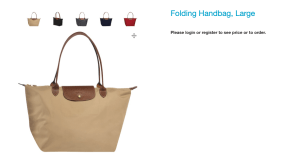Amazon and Longchamp have had enough of the baggage counterfeiters bring to their reputations.
That’s why the two companies filed a legal complaint Oct. 30 in the Western District of Washington, alleging that Michael Christopher Pitta and Preethy Christopher, among other, unnamed defendants, used Amazon’s third-party seller platform to hawk counterfeited Longchamp totes.
The e-commerce giant and the French luxury brand allege that both defendants advertised, sold and distributed counterfeit versions of Longchamp’s famous Le Pliage tote—a bag made of nylon with cowhide leather trim—on their respective Amazon storefronts: B Samson, in the case of Christopher, and Super Brandz in Pitta’s case.
According to Amazon, it has taken both storefronts down from its platform, citing violations of its Business Solutions Agreement (BSA), which sellers sign prior to onboarding with the e-commerce giant. It has also “proactively issued full refunds to customers who purchased purported Longchamp products from defendants.”
In Christopher’s case, his alleged violation of counterfeit rules was compounded by taking “active steps to mislead Amazon and conceal his true location and identity by providing falsified and/or fraudulent identity documents and information in connection with the B Samson selling account.”
Christopher allegedly sold infringing products between February 2020 and December 2023, while Pitta allegedly sold infringing products between October 2020 and December 2023. The complaint does not provide further information about the unnamed defendants, their storefronts or their alleged misconduct.
Amazon has myriad ways of detecting and preventing counterfeit items. In 2023, the company spent over $1.2 billion on counterfeit, fraud and abuse prevention. And since the inception of its Counterfeit Crimes Unit in 2020, it has gone after more than 21,000 bad actors, either through similar lawsuits or by referring violators to law enforcement. Despite the company’s efforts, it appears Christopher and Pitta’s alleged listings slipped through the cracks for several years.
According to the complaint, Longchamp is actively enrolled in two of Amazon’s anti-counterfeit programs, called Brand Registry and Project Zero. The former employs machine learning to proactively identify instances of potential infringement before they ever make it on the platform. It also includes a tool called Report a Violation, which “allows brands to search for, identify and report potentially infringing products using state-of-the-art image search technology. Project Zero, on the other hand, allows brands to directly remove counterfeits of their product from Amazon stores.
Longchamp obtained some of the alleged ersatz items offered for sale on Christopher and Pitta’s storefronts and found them to be fake, the lawsuit states.
“Longchamp has conducted multiple test purchases and reviewed physical samples of Longchamp-branded products sold by defendants’ selling accounts and determined that the products are counterfeit, that each bears a counterfeit Longchamp trademark and that Longchamp has never authorized the sale of such products,” the companies alleged.
The two also assert that Pitta and Christopher—and potentially other defendants— “operated in concert with one another” in their alleged counterfeiting, and that they operate the website fancykatz.ltd.
That domain is still live, and as of Monday, the operators of the site have listed two separate bags—one it calls, “Folding Handbag, Large,” and another it calls, “Shoulder Bags, Club, Large”—that bear resemblance to the Longchamp Le Pliage tote.

Photo via fancykatz.ltd.

Photo via fancykatz.ltd.
The companies state that, in allegedly moving phony products, Christopher, Pitta and the unnamed defendants have done significant harm to consumers’ trust in both Amazon and Longchamp. As such, they have accused the defendants of trademark counterfeiting, trademark infringement and false designation of origin under the Lanham Act; violation of the Washington Consumer Protection Act and breach of contract with Amazon.
The companies have requested that the court enjoin Pitta, Christopher and the unnamed defendants from selling counterfeit products on Amazon and “in any store or in any medium;” that the two not be allowed to aid and abet other purported counterfeiters in selling Longchamp products; that the court allow for all of defendants’ Longchamp-branded inventory to be impounded and destroyed and that the defendants pay damages to both companies.
The lawsuit is far from Amazon’s first legal filing aimed at protecting reputable brands and its consumers. It previously scored a counterfeit lawsuit win with Prada, in which a Chinese seller pled guilty to counterfeiting luxury items and selling them via Amazon.
Last week, Amazon teamed with Google to file a lawsuit against BigBoostUp.com and its operator, in an effort to stop the pervasive review abuse issue both platforms face—Amazon for products, and Google for businesses.
An Amazon spokesperson said the company has no plans to let up on counterfeiters or fraudsters going forward.
“Amazon has a zero-tolerance policy for counterfeit products and collaborated with Longchamp on this joint lawsuit to have a direct impact on bad actors and permanently prevent them selling counterfeits. Amazon will continue to hold bad actors accountable and protect customers, brands, selling partners and our store from fraud and abuse,” the spokesperson said.
